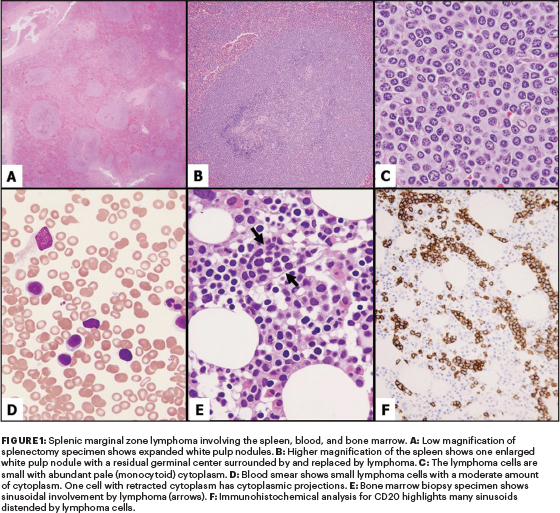The ASCO Post is pleased to present Hematology Expert Review, an ongoing feature that quizzes readers on issues in hematology. In this installment, Drs. Syed Ali Abutalib and L. Jeffrey Medeiros explore the updated World Health Organization (WHO) classification of hematopoietic and lymphoid tissue malignancies, focusing on splenic marginal zone lymphoma. For each quiz question that follows, select the one best answer. The correct answers and accompanying discussions appear below.
GUEST EDITORS

Syed Ali Abutalib, MD

L. Jeffrey Medeiros, MD
Dr. Abutalib is Associate Director of the Hematology and Cellular Therapy Program and Director of the Clinical Apheresis Program at the Cancer Treatment Centers of America, Zion, Illinois; Associate Professor at the Rosalind Franklin University of Medicine and Science; and Founder and Co-Editor-in-Chief of Advances in Cell & Gene Therapy. Dr. Medeiros is Professor and Chair of the Department of Hematopathology at The University of Texas MD Anderson Cancer Center, Houston.
Question 1
Which of the following statements about splenic marginal zone lymphoma is correct?
A. Unlike chronic lymphocytic leukemia, there is an absence of autoimmune thrombocytopenia or anemia in splenic marginal zone lymphoma.
B. Splenic marginal zone lymphoma may account for cases of otherwise unclassifiable chronic leukemias composed of CD5-negative small B cells.
C. The diagnosis of splenic marginal zone lymphoma is excluded in cases with lymph node(s) involvement.
D. The diagnosis of splenic marginal zone lymphoma is excluded in cases with bone marrow involvement.
Question 2
Which of the following statements about the immuno-phenotype of splenic marginal zone lymphoma is correct?
A. Tumor cells mostly express surface IgM.
B. Tumor cells express CD20 and CD79a but are negative for CD10, CD23, CD43, and annexin A1.
C. Ki67 staining shows a distinctive pattern.
D. All of the above
Question 3
Which of the following statements about the genetic profile of splenic marginal zone lymphoma is correct?
A. One-third of splenic marginal zone lymphomas have somatic hypermutation of IGH.
B. Splenic marginal zone lymphoma may have numerous nonspecific recurrent chromosomal translocations.
C. About one-third of splenic marginal zone lymphomas show heterozygous deletion in 7q.
D. Gain of 3q is specific for the diagnosis of splenic marginal zone lymphoma.
Answers to Hematology Expert Review Questions
Question 1
Which of the following statements about splenic marginal zone lymphoma is correct?
Correct answer: B. Splenic marginal zone lymphoma may account for cases of otherwise unclassifiable chronic leukemias composed of CD5-negative small B cells.
Expert Perspective
Splenic marginal zone lymphoma is sometimes accompanied by autoimmune thrombocytopenia or anemia. It may account for many cases of otherwise unclassifiable chronic small cell lymphoid leukemias that are CD5-negative.1 The tumor involves the spleen and splenic hilar lymph nodes, the bone marrow, and often the peripheral blood (Figure 1). The liver may also be involved. Peripheral lymph nodes are not typically involved.1 For more on the differential diagnosis of splenic marginal zone lymphoma, see Table 1.

Question 2
Which of the following statements about the immunophenotype of splenic marginal zone lymphoma is correct?
Correct answer: D. All of the above.
Expert Perspective
Tumor cells express surface IgM and usually IgD. About one-third of patients have a small serum paraprotein, but marked hyperviscosity and hypergammaglobulinemia are uncommon. The lymphoma cells are positive for CD20 and CD79a but are negative for CD10, CD23, CD43, and annexin A1. Ki67 staining shows a distinctive targetoid pattern due to an increased growth fraction in both the reactive germinal center, if present, and the marginal zones involved by lymphoma. Of note, CD5-positive splenic marginal zone lymphomas have been described, representing 5% to 10% of all cases, distinguished by a higher lymphocytosis and diffuse bone marrow infiltration.1
Question 3
Which of the following statements about the genetic profile of splenic marginal zone lymphoma is correct?
Correct answer: C. About one-third of splenic marginal zone lymphomas show heterozygous deletion in 7q.

Expert Perspective
Immunoglobulin heavy and light chain genes have clonal rearrangements, and approximately 50% of the cases have somatic hypermutation. Bias in IGHV1-2*04 usage has been found in 30% of splenic marginal zone lymphomas, suggesting this tumor derives from a highly selected B-cell population. Splenic marginal zone lymphoma lacks recurrent chromosomal translocations.1-3 Approximately 30% of splenic marginal zone lymphomas show a heterozygous deletion in 7q, which is rarely found in other lymphoma subtypes.1,2 Gain of 3q is present in a considerable subset of cases but is not specific for splenic marginal zone lymphoma.1
Additional Features of Splenic Marginal Zone Lymphoma
- MYD88 mutations are rare.
- NOTCH2 and KLF2 are the most frequently mutated genes, but they are nonspecific.
- A small number of cases carry a recurrent t(2;7) (p12;q21).
- Hepatitis C virus–positive cases have been reported to respond to antiviral treatment.
- A small minority of cases undergo large B-cell transformation.
Adapted from Piris MA et al.1
DISCLOSURE: Dr. Abutalib is an advisor for AstraZeneca and has served on the advisory board of Jazz Pharmaceuticals. Dr. Medeiros reported no conflicts of interest.
REFERENCES
2. Algara P, Mateo MS, Sanchez-Beato M, et al: Analysis of the lgV(H) somatic mutations in splenic marginal zone lymphoma defines a group of unmutated cases with frequent 7q deletion and adverse clinical course. Blood 99:1299-1304, 2002.
3. Bikos V, Darzentas N, Hadzidimitriou A, et al: Over 30% of patients with splenic marginal zone lymphoma express the same immunoglobulin heavy variable gene: Ontogenetic implications. Leukemia 26:1638-1646, 2012.

